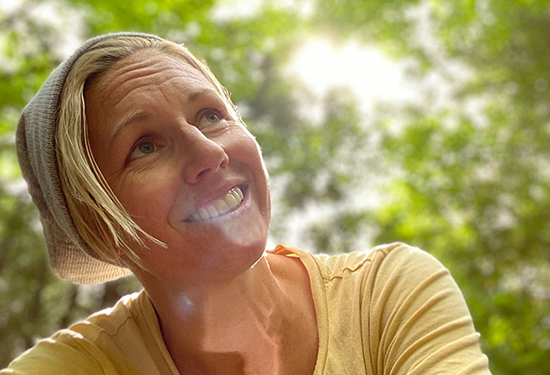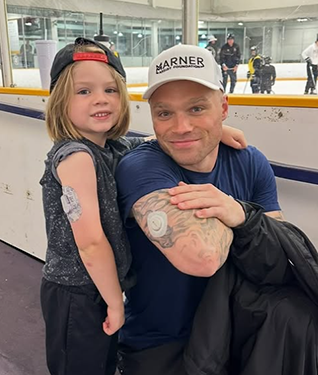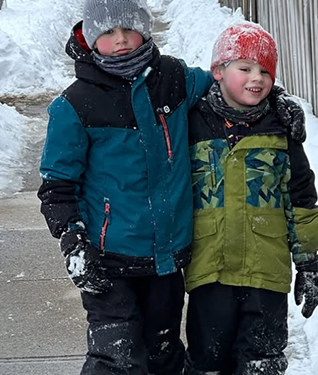 Kendra Fisher is a former member of Team Canada’s hockey program, a 3x world inline hockey champion, and a firefighter. She is also the Founder of Mentally Fit; a professional speaker, a mental health coach, and an author in the making. Kendra may be best known for her hockey career, and for making the life-altering decision to step away from her dream of playing for Team Canada in order to manage diagnoses of Generalized Anxiety Disorder, Panic Disorder, Clinical Depression, Agoraphobia, and OCD.
Kendra Fisher is a former member of Team Canada’s hockey program, a 3x world inline hockey champion, and a firefighter. She is also the Founder of Mentally Fit; a professional speaker, a mental health coach, and an author in the making. Kendra may be best known for her hockey career, and for making the life-altering decision to step away from her dream of playing for Team Canada in order to manage diagnoses of Generalized Anxiety Disorder, Panic Disorder, Clinical Depression, Agoraphobia, and OCD.
Kendra has been open about her journey with mental illness, and deeply vulnerable in sharing the devastating loss of her son, River, at 32 weeks gestation. When her son Bodhi was a toddler, he was diagnosed with type 1 diabetes (T1D). Now a Breakthrough T1D Canada Ambassador, Kendra is also involved with the Breakthrough T1D Walk in Toronto. She recently sat down with Breakthrough T1D Canada to share how her family navigated Bodhi’s diagnosis, all in the wake of infant loss and during the challenges of the pandemic.
Breakthrough T1D Canada: Can you share a little about the time of Bodhi’s diagnosis?
Kendra:
It was during COVID, so everything already felt intense and overwhelming. I was working as a full-time firefighter, on shift in a high-stress environment. Fortunately, Bodhi’s other mom, Kristy, was incredibly intuitive and picked up early signs that something wasn’t right.
Bodhi had been drinking constantly; he’d go from glass to glass, drinking everyone’s water. At first, we didn’t think too much of it. On its own, the thirst didn’t seem alarming. But at the same time, he was soaking through diapers. We started doubling up, laying down crib liners, trying everything, and nothing worked.
Kristy kept raising concerns that this was something more serious. Having lost our son, I was sure we were being hypervigilant—looking for problems, being too cautious. But one morning, Bodhi decided he was only going to use the potty, and by 11 a.m., he’d filled it ten times. Kristy messaged me as I was coming off shift and said she was taking him to the urgent care clinic at St. Joe’s.
Just based on those two symptoms, they checked his blood sugar, and it was incredibly high. We were told he was likely in DKA and that we either needed to admit him immediately or take him by ambulance to Sick Kids to begin treatment.
Because of COVID protocols, only one parent could go into the hospital. Kristy went in with him while I waited outside. I’ll never forget that call, Kristy was crying. She told me the doctor was coming to meet me in the lobby to give permission for me to come in. That’s where I was told, face to face, “He has diabetes.” Sick Kids would be overseeing his care.
 The surreal part was that those were the only symptoms; excessive thirst and urination. He was otherwise his normal, happy, outgoing self. They got him on an IV right away and started titrating insulin. It was all happening so fast, trying to understand what was going on while still in complete shock.
The surreal part was that those were the only symptoms; excessive thirst and urination. He was otherwise his normal, happy, outgoing self. They got him on an IV right away and started titrating insulin. It was all happening so fast, trying to understand what was going on while still in complete shock.
They later got a more precise ketone reading and, miraculously, Bodhi wasn’t in full DKA. They called him a “warrior.” He had somehow drunk enough water to flush out the ketones. At 6 p.m. that same day, they told us we could take him home.
As a firefighter, my only experience with diabetes was responding to people in crisis. From that limited perspective, it didn’t seem possible that it was safe to bring him home. But that was day one of our new life.
And we were navigating all of this in isolation. One parent at appointments. We’d just lost River. We had our older son, Finley, who was five at the time, and the last time we had gone to the hospital for his baby brother, we came home alone. His fear was enormous. He was terrified for his little brother. As a family, we had to divide and conquer. Bodhi went straight into diabetes day care at Sick Kids the next day, and we were thrown into this world we didn’t yet understand.
Breakthrough T1D Canada: What do you want other parents to understand about type 1 diabetes?
Kendra:
I truly believe people mean well when they share their responses to learning about Bodhi; they want to help, be kind, and be supportive. But a lot of people confuse type 1 diabetes with type 2 diabetes. We were met with well-meaning, but misinformed advice. People telling us Bodhi would be fine if we cut out sugar or junk food. A friend giving him an apple instead of a lollipop, not realizing I hadn’t accounted for it in his insulin dose and that it didn’t matter that it was a healthy snack.
Others suggested things like a keto diet so he wouldn’t need insulin. And while these suggestions might come from a good place, they can be exhausting to correct, especially when you’re still trying to understand it all yourself.
Even those with experience of T1D can sometimes overwhelm you with too much information. In the beginning, it felt like there was no soft place to land. No clear starting point. This diagnosis doesn’t just affect your child; it affects your whole family.
Finley has been an incredible big brother. He’s patient, kind, and understanding. We went from having an open snack shelf to locking cupboards. His eating schedule has had to adapt to Bodhi’s. But it’s hard, finding balance between giving your child with T1D the attention they need, while still being fully present for your other child.
Breakthrough T1D Canada: What have you learned since those early days?
Kendra:
I’ve learned how important it is not to lean too heavily into toxic positivity. At first, I tried to “silver lining” everything. “At least we have CGMs, pumps, amazing doctors.” And it’s all true. But I also needed to leave room for honesty.
 Through the lens of mental health, I’ve learned that it’s okay to say, “This sucks sometimes.” Bodhi doesn’t always want the attention that comes with being different; asking a parent to enter carbs when a friend offers a snack or navigating insulin doses at events. That constant spotlight can be hard for a kid.
Through the lens of mental health, I’ve learned that it’s okay to say, “This sucks sometimes.” Bodhi doesn’t always want the attention that comes with being different; asking a parent to enter carbs when a friend offers a snack or navigating insulin doses at events. That constant spotlight can be hard for a kid.
And as a parent, it’s heartbreaking knowing there are parts of his experience I’ll never truly understand. But we sit with him. We let him tell us when it’s hard, when it hurts, when he’s frustrated. We don’t try to fix it, we just let him know it’s okay to feel that way.
In the beginning, I didn’t want to accept what it really meant to be his caregiver. The decision fatigue is real. Constant calculations: Is it hot out? How active will he be? What’s the carb ratio? When’s the next blood sugar spike? What’s the correction factor? These aren’t questions other parents have to ask themselves before heading out the door.
We give Bodhi permission to feel everything. To be disappointed. To be sad. We don’t downplay his experience. That’s not our right. And it wouldn’t help him feel any less alone.
Breakthrough T1D Canada: Any final thoughts you’d like to share?
Kendra:
We are so grateful for the research, the tech, and the medical teams that support us. These things do make managing T1D more possible than ever before.
But we take it one day at a time, with honesty.
(Somewhere in the conversation, Kendra receives a message from Bodhi’s kindergarten teacher.)
Kendra:
I saw the message and my heart jumped. It turned out another child had hit Bodhi on the shoulder. The teacher was just letting me know and had informed the other parents too. I took a breath and reminded myself, he’s upright, he’s okay, we’re winning today.
That’s how we do this.
One breath at a time.
One moment at a time.
You can learn more about Kendra Fisher and follow her podcast here: https://kendrafisher.com/



